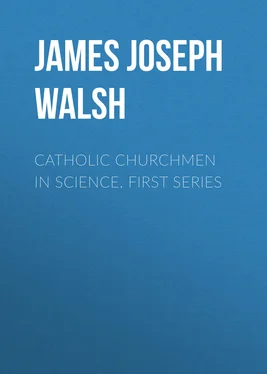James Walsh - Catholic Churchmen in Science. First Series
Здесь есть возможность читать онлайн «James Walsh - Catholic Churchmen in Science. First Series» — ознакомительный отрывок электронной книги совершенно бесплатно, а после прочтения отрывка купить полную версию. В некоторых случаях можно слушать аудио, скачать через торрент в формате fb2 и присутствует краткое содержание. Жанр: foreign_prose, foreign_religion, foreign_antique, на английском языке. Описание произведения, (предисловие) а так же отзывы посетителей доступны на портале библиотеки ЛибКат.
- Название:Catholic Churchmen in Science. First Series
- Автор:
- Жанр:
- Год:неизвестен
- ISBN:нет данных
- Рейтинг книги:4 / 5. Голосов: 1
-
Избранное:Добавить в избранное
- Отзывы:
-
Ваша оценка:
- 80
- 1
- 2
- 3
- 4
- 5
Catholic Churchmen in Science. First Series: краткое содержание, описание и аннотация
Предлагаем к чтению аннотацию, описание, краткое содержание или предисловие (зависит от того, что написал сам автор книги «Catholic Churchmen in Science. First Series»). Если вы не нашли необходимую информацию о книге — напишите в комментариях, мы постараемся отыскать её.
Catholic Churchmen in Science. First Series — читать онлайн ознакомительный отрывок
Ниже представлен текст книги, разбитый по страницам. Система сохранения места последней прочитанной страницы, позволяет с удобством читать онлайн бесплатно книгу «Catholic Churchmen in Science. First Series», без необходимости каждый раз заново искать на чём Вы остановились. Поставьте закладку, и сможете в любой момент перейти на страницу, на которой закончили чтение.
Интервал:
Закладка:
James J. Walsh
Catholic Churchmen in Science [First Series] / Sketches of the Lives of Catholic Ecclesiastics Who Were Among the Great Founders in Science
PREFACE
The following sketches of the lives of clergymen who were great scientists have appeared at various times during the past five years in Catholic magazines. They were written because the materials for them had gradually accumulated during the preparation of various courses of lectures, and it seemed advisable to put them in order in such a way that they might be helpful to others working along similar lines. They all range themselves naturally around the central idea that the submission of the human reason to Christian belief, and of the mind and heart to the authority of the Church, is quite compatible with original thinking of the highest order, and with that absolute freedom of investigation into physical science, which has only too often been said to be quite impossible to churchmen. For this reason friends have suggested that they should be published together in a form in which they would be more easy of consultation than when scattered in different periodicals. It was urged, too, that they would thus also be more effective for the cause which they uphold. This friendly suggestion has been yielded to, whether justifiably or not the reader must decide for himself. There is so great a flood of books, good, bad, and indifferent, ascribing their existence to the advice of well-meaning friends, that we poor authors are evidently not in a position to judge for ourselves of the merit of our works or of the possible interest they may arouse.
I have to thank the editors of the American Catholic Quarterly Review , of the Ave Maria , and of The Ecclesiastical Review and The Dolphin , for their kind permission to republish the articles which appeared originally in their pages. All of them, though substantially remaining the same, have been revised, modified in a number of particulars, and added to very considerably in most cases.
The call for a second edition–the third thousand–of this little book is gratifying. Its sale encouraged the preparation of a Second Series of CATHOLIC CHURCHMEN IN SCIENCE, and now the continued demand suggests a Third Series, which will be issued during the year. Some minor corrections have been made in this edition, but the book is substantially the same.
I.
THE SUPPOSED OPPOSITION OF SCIENCE AND RELIGION
A common impression prevails that there is serious, if not invincible, opposition between science and religion. This persuasion has been minimized to a great degree in recent years, and yet sufficient of it remains to make a great many people think that, if there is not entire incompatibility between science and religion, there is at least such a diversity of purposes and aims in these two great realms of human thought that those who cultivate one field are not able to appreciate the labors of those who occupy themselves in the other. Indeed, it is usually accepted as a truth that to follow science with assiduity is practically sure to lead to unorthodoxy in religion. This is supposed to be especially true if the acquisition of scientific knowledge is pursued along lines that involve original research and new investigation. Somehow, it is thought that any one who has a mind free enough from the influence of prejudice and tradition to become an original thinker or investigator, is inevitably prone to abandon the old orthodox lines of thought in respect to religion.
Like a good many other convictions and persuasions that exist more or less as commonplaces in the subconscious intellects of a great many people, this is not true. Our American humorist said that it is not so much the ignorance of mankind that makes him ridiculous as the knowing so many things "that ain't so." The supposed opposition between science and religion is precisely an apposite type of one of the things "that ain't so." It is so firmly fixed as a rule, however, that many people have accepted it without being quite conscious of the fact that it exists as one of the elements influencing many of their judgments–a very important factor in their apperception.
Now, it so happens that a number of prominent original investigators in modern science were not only thoroughly orthodox in their religious beliefs, but were even faithful clergymen and guiding spirits for others in the path of Christianity. The names of those who are included in the present volume is the best proof of this. The series of sketches was written at various times, and yet there was a central thought guiding the selection of the various scientific workers. Most of them lived at about the time when, according to an unfortunate tradition that has been very generally accepted, the Church dominated human thinking so tyrannously as practically to preclude all notion of original investigation in any line of thought, but especially in matters relating to physical science. Most of the men whose lives are sketched lived during the fifteenth, sixteenth, and first half of the seventeenth centuries. All of them were Catholic clergymen of high standing, and none of them suffered anything like persecution for his opinions; all remained faithful adherents of the Church through long lives.
It is hoped that this volume, without being in any sense controversial, may tend to throw light on many points that have been the subject of controversy; and by showing how absolutely free these great clergymen-scientists were to pursue their investigations in science, it may serve to demonstrate how utterly unfounded is the prejudice that would declare that the ecclesiastical authorities of these particular centuries were united in their opposition to scientific advance.
There is no doubt that at times men have been the subject of persecution because of scientific opinions. In all of these cases, without exception, however–and this is particularly true of such men as Galileo, Giordano Bruno, and Michael Servetus–a little investigation of the personal character of the individuals involved in these persecutions will show the victims to have been of that especially irritating class of individuals who so constantly awaken opposition to whatever opinions they may hold by upholding them overstrenuously and inopportunely. They were the kind of men who could say nothing without, to some extent at least, arousing the resentment of those around them who still clung to older ideas. We all know this class of individual very well. In these gentler modern times we may even bewail the fact that there is no such expeditious method of disposing of him as in the olden time. This is not a defence of what was done in their regard, but is a word of explanation that shows how human were the motives at work and how unecclesiastical the procedures, even though church institutions, Protestant and Catholic alike, were used by the offended parties to rid them of obnoxious argumentators.
In this matter it must not be forgotten that persecution has been the very common associate of noteworthy advances in science, quite apart from any question of the relations between science and religion. There has scarcely been a single important advance in the history of applied science especially, that has not brought down upon the devoted head of the discoverer, for a time at least, the ill-will of his own generation. Take the case of medicine, for instance. Vesalius was persecuted, but not by the ecclesiastical authorities. The bitter opposition to him and to his work came from his colleagues in medicine, who thought that he was departing from the teaching of Galen, and considered that a cardinal medical heresy not to be forgiven. Harvey, the famous discoverer of the circulation of the blood, lost much of his lucrative medical practice after the publication of his discovery, because his medical contemporaries thought the notion of the heart pumping blood through the arteries to be so foolish that they refused to admit that it could come from a man of common sense, much less from a scientific physician. Nor need it be thought that this spirit of opposition to novelty existed only in the sixteenth and seventeenth centuries. Almost in our own time Semmelweis, who first taught the necessity for extreme cleanliness in obstetrical work, met with so much opposition in the introduction of the precautions he considered necessary that he was finally driven insane. His methods reduced the mortality in the great lying-in hospitals of Europe from nearly ten per cent for such cases down to less than one per cent, thus saving many thousands of lives every year.
Читать дальшеИнтервал:
Закладка:
Похожие книги на «Catholic Churchmen in Science. First Series»
Представляем Вашему вниманию похожие книги на «Catholic Churchmen in Science. First Series» списком для выбора. Мы отобрали схожую по названию и смыслу литературу в надежде предоставить читателям больше вариантов отыскать новые, интересные, ещё непрочитанные произведения.
Обсуждение, отзывы о книге «Catholic Churchmen in Science. First Series» и просто собственные мнения читателей. Оставьте ваши комментарии, напишите, что Вы думаете о произведении, его смысле или главных героях. Укажите что конкретно понравилось, а что нет, и почему Вы так считаете.












